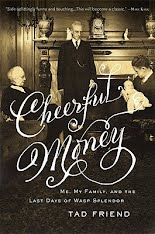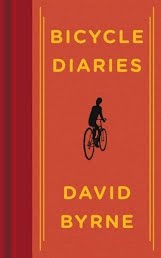On WASPiness

Another great find from this week's NYTimes Book Review is New Yorker writer Tad Friend's memoir, "Cheerful Money: Me, My Family, and the Last Days of Wasp Splendor.
The Times pithily describes Friend's book as recounting "with amiable nostalgia, the foibles and predilections of a declining caste." Although I'm not exactly from the Nantucket-summer-home set, I can certainly relate in a general way to some of the idiosyncrasies he describes.
A couple good excerpts:
“If Catholic guilt is ‘I’ve been bad’ and Jewish guilt is ‘You’ve been bad,’ then WASP guilt is ‘You probably think I’ve been bad.’ ”
“Visible striving or seriousness of purpose is unWASP because it suggests that you aren't yet at-- haven't always been at-- the top."
Real talk from David Byrne

“The two biggest self-deceptions of all are that life has a ‘meaning’ and that each of us is unique.”
-David Byrne (of Talking Heads fame) in his new book, Bicycle Diaries, reviewed this week in the New York Times
Ha-- I'm looking forward to reading this book.
Eternal Spring of San Francisco

Yes, it's time to break out the sweaters and fire up the tea kettle for another typical San Francisco summer.
Mark Twain is often quoted as saying something like "the coldest winter I ever spent was a summer in San Francisco," but it turns out that's basically a myth. He did, however, once write of the "eternal Spring of San Francisco," which I think sounds much nicer, anyway.
The kind that likes to grow up

Have you ever read the last chapter (Chapter 17, to be precise) of The Adventures of Peter Pan? Me neither, until today. It's kind of a cool "where are they now." And, as wonderful as the idea of Neverland seems, I think Wendy has the happiest ending of all:
That was the last time the girl Wendy ever saw [Peter Pan]. For a little longer she tried for his sake not to have growing pains; and she felt she was untrue to him when she got a prize for general knowledge. But the years came and went without bringing the careless boy; and when they met again Wendy was a married woman, and Peter was no more to her than a little dust in the box in which she had kept her toys.
Wendy was grown up. You need not be sorry for her. She was one of the kind that likes to grow up. In the end she grew up of her own free will a day quicker than other girls.